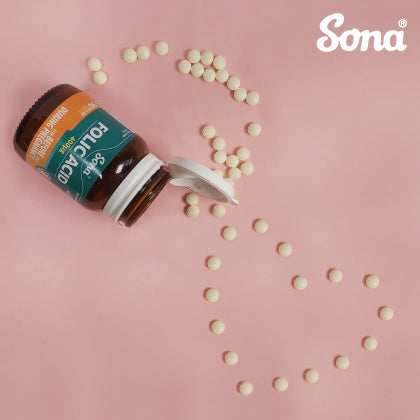
Confused? You’re not alone. Too much information on what to do and what not to do during this time is overwhelming but when you break through the noise it is pretty simple. It is important to consume a healthy balanced diet during pregnancy in order to get the vitamins and minerals you and your baby require. It is also important to take certain supplements while you are pregnant, especially in your first trimester as this is a very important time for your baby’s development and taking certain supplements will reduce the risk of problems at this stage.
Below are supplements that are recommended to take during the first trimester of pregnancy:
- Folic Acid: Folic acid is the synthetic form of folate, a B-group vitamin. Folate is required for a baby’s cells to divide during pregnancy, as well as for the development of their nervous system. It is within the first few weeks of pregnancy that the neural tube closes and fuses. Later, within pregnancy, it develops into the baby’s brain and spinal cord. As a result, a lack in folate can cause neural tube defects. The World Health Organisation recommend that women should supplement with 400µg/d of folic acid while attempting pregnancy and until they are 3 months pregnant (the first trimester).
Sona Folic Acid provides 400µg of Folic Acid, to support adequate maternal tissue growth during pregnancy.
- Vitamin D: Vitamin D is important for the maintenance of normal bones and teeth, muscle function, and cell division. It is also important for the absorption and utilisation of calcium and phosphorus, the maintenance of normal blood calcium concentration, the normal function of the immune system and inflammatory response.
Since vitamin D helps regulate the amount of calcium and phosphate found in the body, it helps regulate the amount in our baby’s body too. Calcium is needed to help strengthen the baby’s rapidly developing bones and teeth, as well as boost muscle, heart, and nerve development. Like calcium, phosphate also helps strengthen the baby’s bones. It is also incredibly important for many bodily functions such as clotting, kidney function, tissue and cell repair, muscle concentrations and a normal heart rhythm.
It is recommended that pregnant women supplement with 10ug of vitamin D each day. Sona D 400 contains 10ug of vitamin D per tablet.
- Iron: Iron is an essential mineral we need for growth and development. Iron’s main role in the body is to produce hemoglobin, a protein molecule in red blood cells that transports oxygen from the lungs to the body’s tissues, as well as myoglobin, a protein that provides oxygen to muscles.
During pregnancy, your body requires twice as much iron to produce more blood in order to supply oxygen to your baby. Iron deficiency in pregnancy heightens the risk of a baby having a low birth weight, as well as premature delivery.
Healthy pregnant women should supplement with 16-20mg of iron a day throughout pregnancy.
Sona Iron Complete is a specially formulated, delicious tasting, non constipating Iron supplement contain 20mg of iron per serving.
- Omega 3 fish oils: Eating 2-3 portions of oily fish like salmon or mackerel every week is no easy feat. Especially if you’re feeling queasy. This is where supplements can help! Taking omega 3 fish oils in early pregnancy can assist the baby's brain and eye health and pre-program the baby's cell membranes for optimum lifelong wellness.
The Sona Pregnaplan range contains all the above nutrients (as well as many others!) in the recommended dosage in a convenient one-a-day capsule to remove the guesswork before, during and after pregnancy.
It is important to consult your healthcare professional if you are pregnant. Your doctor may also advise you to supplement with some others supplements while you are pregnant, such as vitamin C, vitamin B12, and calcium, depending on your diet, and whether you could be at risk of deficiency.
References
-
Cusick S, Georgieff M. The Role of Nutrition in Brain Development: The Golden Opportunity of the “First 1000 Days”. The Journal of Pediatrics. 2016;175:16-21.
-
Ding, D., Lo, T., Wu, T., & Li, P. (2019). Effect of Vitamin D supplementation during pregnancy on maternal and perinatal outcomes. Tzu Chi Medical Journal, 31(4), 201. doi: 10.4103/tcmj.tcmj_32_19.
-
EHRLICH, G. (2010). Sunshine and Vitamin D. A Comprehensive Guide to the Benefits of the “Sunshine Vitamin”. The Journal Of Rheumatology, 37(2), 475-475. doi: 10.3899/jrheum.091173.
-
(HSE,2021). Retrieved 16 June 2021, from https://www.hse.ie/eng/about/who/acute-hospitals-division/woman-infants/clinical-guidelines/nutrition-during-pregnancy.pdf.
-
(HSE, 2021). Retrieved 17 June 2021, from https://www.hse.ie/eng/about/who/acute-hospitals-division/woman-infants/clinical-guidelines/nutrition-during-pregnancy.pdf.
-
Georgieff, M., Krebs, N., & Cusick, S. (2019). The Benefits and Risks of Iron Supplementation in Pregnancy and Childhood. Annual Review Of Nutrition, 39(1), 121-146. doi: 10.1146/annurev-nutr-082018-124213.
-
James A Greenberg, Stacey J Bell, Yong Guan, Yan-hong Yu. Folic Acid Supplementation and Pregnancy: More Than Just Neural Tube Defect Prevention. Rev Obstet Gynecol. 2011 Summer; 4(2): 52–59.
-
Periconceptional folic acid supplementation to prevent neural tube defects [Internet]. World Health Organization. 2018 [cited 8 December 2018]. Available from: https://www.who.int/elena/titles/folate_periconceptional/en/.
-
Planning a Pregnancy - INDI. (2021). Retrieved 17 June 2021, from https://www.indi.ie/fact-sheets/fact-sheets-on-women-s-health/544-planning-a-pregnancy.html.
-
Recommendations: Women & Folic Acid [Internet]. Centers for Disease Control and Prevention. 2018 [cited 8 December 2018]. Available from: https://www.cdc.gov/ncbddd/folicacid/recommendations.html.
-
Vitamins, minerals, and supplements in pregnancy. (2021). Retrieved 22 June 2021, from https://www.nhs.uk/pregnancy/keeping-well/vitamins-supplements-and-nutrition/.
-
Women and Iron - INDI. (2021). Retrieved 17 June 2021, from https://www.indi.ie/women-s-health/546-women-and-iron.html.
-
Young, I., Parker, H., Rangan, A., Prvan, T., Cook, R., & Donges, C. et al. (2018). Association between Haem and Non-Haem Iron Intake and Serum Ferritin in Healthy Young Women. Nutrients, 10(1), 81. doi: 10.3390/nu10010081.
-
Gallagher S. (2004). Omega 3 oils and pregnancy. Midwifery today with international midwife, (69), 26–31.
